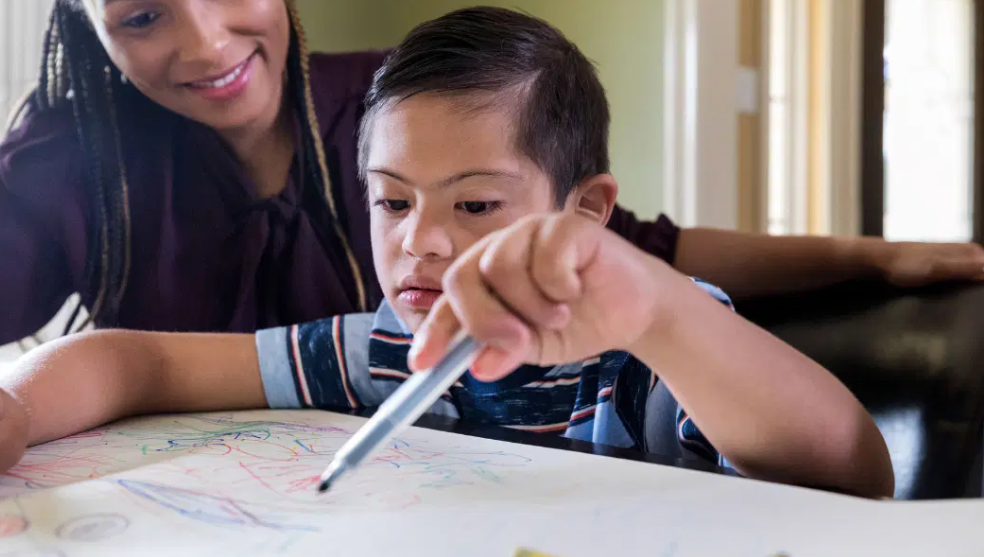
Just as there are different types of accommodations that can support emotional and mental health at school, there are services to help kids’ well-being during their time at school. In the IEP, mental health services can be found listed as related services (sometimes called Designated Instruction and Services; DIS). These services and specialized supports are determined by the IEP team and are based on the individual needs of each student, in order to help them meet their educational goals. Here are 6 common mental health services that can be included in IEPs.
Gain access to Undivided’s comprehensive resources and receive our weekly newsletter.
1. School counseling for academic and personal goals
Under IDEA, school counseling can be used to support students both academically and personally, and can be provided by social workers, psychologists, guidance counselors, or other qualified providers. The counselor can work with a student to set and reach goals, develop a more positive attitude toward school, and identify their strengths. They can also work with students on social-emotional needs, including developing self-knowledge, responsibility, and better decision-making.
Note that IDEA lists counseling services separate from parent counseling/training, rehabilitation counseling, and psychological services.
2. Psychological assessments
In California, psychological services include psychological and educational assessments as well as collaboration with school staff to implement services and intervention strategies. Services might include support outside of school—for example, counseling for a student and their family—and services in the classroom, such as putting positive behavioral intervention strategies into place.
3. Social worker services
School-based social work services are provided on a consult basis and not as a direct service. Dr. Sarah Pelangka (BCBA-D), a special education advocate and owner of KnowIEPs, notes that social work services can include the following:
- Working with a student’s family and others to address home-based issues that affect the student’s life at school
- Identifying school and community resources needed to help a child learn
- Developing positive behavioral intervention strategies
4. Social skills groups
Another service that can support a student’s emotional and mental health at school is social skills groups. If needed, IEP teams can offer these social skills groups with a school counselor.
5. Educationally Related Intensive Counseling Services (ERICS)
Educationally Related Intensive Counseling Services (ERICS)—formerly called Educationally Related Mental Health Services (ERMHS)—are usually for students with severe behavioral and emotional symptomatology, and are often the last effort to prevent the need for a more restrictive learning environment. Parents can request an assessment for this service if the student isn’t benefiting from other interventions or supports such as school-based counseling, behavioral intervention support, socio-emotional learning opportunities, and referrals for services in the community.
Intensive counseling can include assessment of needs, crisis intervention within the educational setting, outpatient counseling, therapeutic learning class placements, case management, parent consultation, and/or residential placement recommendations. Assessments span socio-emotional performance, student’s progress on goals and objectives, grades and attendance, and other measures.
Pelangka shares that once a student qualifies they also have access to wraparound services in which the student can have access to a student partner who will meet with the student both at school and in the home, which is beneficial because it serves as a bridge between both settings. Pelangka also notes that ERICS and wraparound services must be linked to goals within the IEP, as they are considered direct service providers.
6. Medications and health plan overseen by school nurse
If a student is taking medication to address mental health challenges, this information is added to the Individualized Health Plan (IHP) in the IEP. Undivided Non-Attorney Special Education Advocate Lisa Carey notes, “There is a part in the present levels in the IEP where the parents and the nurse who does the assessment every three years writes in the medications that the child is on in any conditions.” Carey adds, “This isn’t just about mental health—the child could be taking Claritin for allergies.”
For more on mental health and IEPs, check out the related resources below.
Gain access to Undivided’s comprehensive resources and receive our weekly newsletter.
Join the Undivided Community to get more resources like this in your inbox
100% free | Curated for you

A Navigator is your Partner at each turn
*Currently offering Navigator Kickstarts to residents of California






